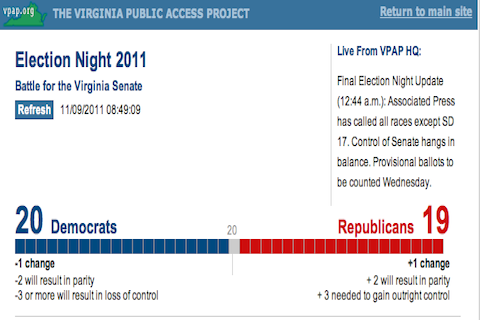Fortunately for the Republicans, they managed to retain all seven of their contested seats, which actually included three open seats. Bill Carrico won handily in Sen. 40, replacing retired Bill Wampler. Former delegate and archconservative Dick Black (Sen. 13) and newcomer and TP favorite Tom Garrett (Sen. 22) each won their open seats created by redistricting. Ralph Smith had to move into another district—Sen 19—to run, but still won.
Of the contested seats held by Democrats, it was hoped that the Republicans would take at least three of them. As of midnight, only one was a sure win: Bill Stanley narrowly beat Roscoe Reynolds by just over 1% of the votes in Sen. 20. Though Bryce Reeves beat Edd Houck in Sen. 17, it was by less than 0.2% (or less than 100 votes), and as such will entitle Houck to call for a recount.
Probably the biggest disappointment for Republicans was losing Sen. 38. Conservative Democrat Phil Puckett was able to hang on and beat newcomer Adam Light in a race that saw a tremendous amount of time, effort, and money. Other tight races that the Democrats won included: John Miller over Mickey Chohany in Sen. 1; and George Barker over Miller Baker in Sen. 39.
In some not so close races that Republicans had hoped they would win, Democrat incumbents were able to hold on: Ralph Northam beat Ben Loyola in Sen. 6; John Edwards beat David Nutter in Sen. 21; Chuck Colgan beat Tom Gordy in Sen. 29; Mark Herring beat Patricia Phillips in Sen. 33; Toddy Puller beat Jeff Frederick in Sen. 36; and Dave Marsden beat Jason Flannery in Sen. 37.
With the Reeves-Houck race sure to go to recount, neither political party can yet claim a majority. If Houck wins the recount, the Dems get the majority at 21-19. If Reeves wins, it’s a technical tie. With Lt. Gov. Bill Bolling, a Republican, serving also as the president of the Senate, his vote would thus give the Republicans a working majority. This also means that neither party will be able to run roughshod over the other with partisan legislation, knowing that they only have to pick off one or two senators from the other party to scramble the other party’s legislation. A 20-20 split would also mean power sharing of the committee chairmanships.
All in all, this election fell far short of the high hopes the Republicans had for a decidedly conservative majority.
Joe Guarino, chairman
Legislative Committee
Richmond TEA Party
www.richmondteaparty.com







